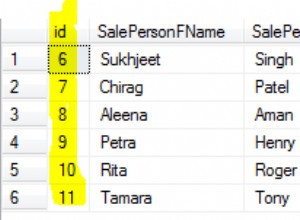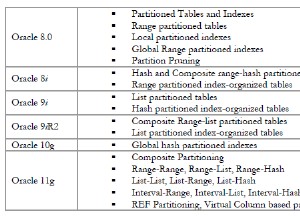Une ligne est représentée par un type composite, comme
CREATE TYPE mytype AS (
id integer,
name text,
fromdate timestamp with time zone
);
Vous pouvez utiliser un tel type comme argument de fonction.
Pour chaque table PostgreSQL, il existe automatiquement un type avec le même nom et les mêmes colonnes :
CREATE TABLE mytable (
id integer PRIMARY KEY,
name text,
fromdate timestamp with time zone NOT NULL
);
Vous pouvez donc créer une fonction qui prend en argument un tableau de ce type :
CREATE OR REPLACE FUNCTION myfunc(arg mytable[]) RETURNS void
LANGUAGE plpgsql IMMUTABLE STRICT AS
$$DECLARE
t mytable;
BEGIN
FOREACH t IN ARRAY arg LOOP
RAISE NOTICE 'id = %', t.id;
END LOOP;
END;$$;
Vous pouvez l'appeler comme ceci (en supposant qu'il y a deux lignes dans mytable ):
SELECT myfunc(array_agg(mytable)) FROM mytable;
NOTICE: id = 1
NOTICE: id = 2
┌────────┐
│ myfunc │
├────────┤
│ │
└────────┘
(1 row)
Alternativement, vous pouvez créer une fonction qui prend un curseur comme argument :
CREATE OR REPLACE FUNCTION myfunc(arg refcursor) RETURNS void
LANGUAGE plpgsql IMMUTABLE STRICT AS
$$DECLARE
t mytable;
BEGIN
LOOP
FETCH NEXT FROM arg INTO t;
EXIT WHEN NOT FOUND;
RAISE NOTICE 'id = %', t.id;
END LOOP;
END;$$;
Cela peut être appelé dans une transaction comme suit :
BEGIN;
DECLARE c CURSOR FOR SELECT * FROM mytable;
SELECT myfunc('c');
NOTICE: id = 1
NOTICE: id = 2
┌────────┐
│ myfunc │
├────────┤
│ │
└────────┘
(1 row)
COMMIT;




